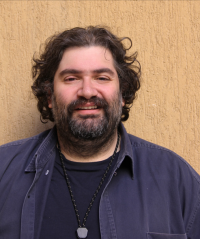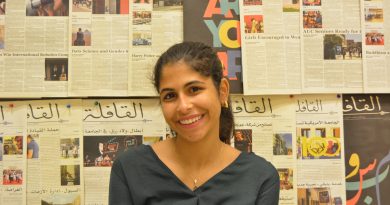Syrians Seek Refuge From Their Refuge

By: Hana Afifi
I happened to be there when tens of Syrians were standing in line at the department of passports and residency, waiting to renew their visa. There were men and women of all ages desperately waiting to finish the long process of paperwork.
At one point, they were all asked to step back and let the Egyptians proceed first – in a not-so-friendly way, to use a euphemism. It was ironic and sad how this felt like one of the few situations where Egyptians were actually privileged in their own country.
I heard complaints by the refugees who had no option but to let it go, waiting to obtain their legal status in Egypt.
I talked to a Syrian man in his forties, who said he had come at 3:30 a.m. just to be able to reserve a place in the long queue. But it was not the first time he had gone.
He had been going for two months and half. One time he would sign a paper, the following time another paper, a third time he would find out there was no work at the office that day, and so on.
It was the first time that I witnessed the process that Syrians had to go through in order to be here in Egypt; to be able to live – or try to live.
Bureaucracy does not help the Syrian refugees living here, and the people do not make it easier. The amount of xenophobia towards Syrians on a daily basis makes it hard for them to cope with life in Egypt.
In 6 of October City, a Syrian wanted to work as a tok-tok driver, like many Egyptians, but it is not bureaucracy that stood in his way, but the Egyptian drivers. Why?
One of the things Syrians hear from Egyptians in the streets is that they compete with them over their ‘bread’ – their jobs.
But Syrians have opened their own restaurants, shops and factories. Syrian investors ranked second among Arab and foreign investors with a total capital of EGP 108 million, according to the August 2013 Monthly Analytic Report by Dcode, an economic and financial consultancy firm.
Another number put forward by the Syrian Solidarity Movement is $11.6 billion in money transfers to Egypt since early 2012.
I understand that those numbers are relevant to the economy, but not so much to individuals. After all, the money distribution from the economy is not equal. Growth does not lead to poverty reduction, because it does not equally affect all strata in the population.
According to a 2012 book by Ray Bush, a professor of African studies at the University of Leeds in England, 43 percent of Egyptians are living on less than $2 a day.
This means that the Syrians’ contribution to the economy does not necessarily reflect on all Egyptians’ income.
However, the reality is that those Syrians come with their own money – there are no refugee camps for Syrians in Egypt. They invest like foreign investors who are very much welcomed in Egypt.
I wish we were more open to welcoming our Arab neighbors who are here because they simply cannot go back to their country.
I don’t know about the presence of Syrian ‘armed militants’ in protests, but I sure know that 200 to 300 thousand Syrians fled their country to live safely and with dignity in Egypt. I also know that unemployment and poverty have existed way before the Syrians came; so my mind cannot grasp the xenophobia.
They came to seek refuge here, but they are fleeing our country, ready to die in a boat, rather than live in Egypt…


